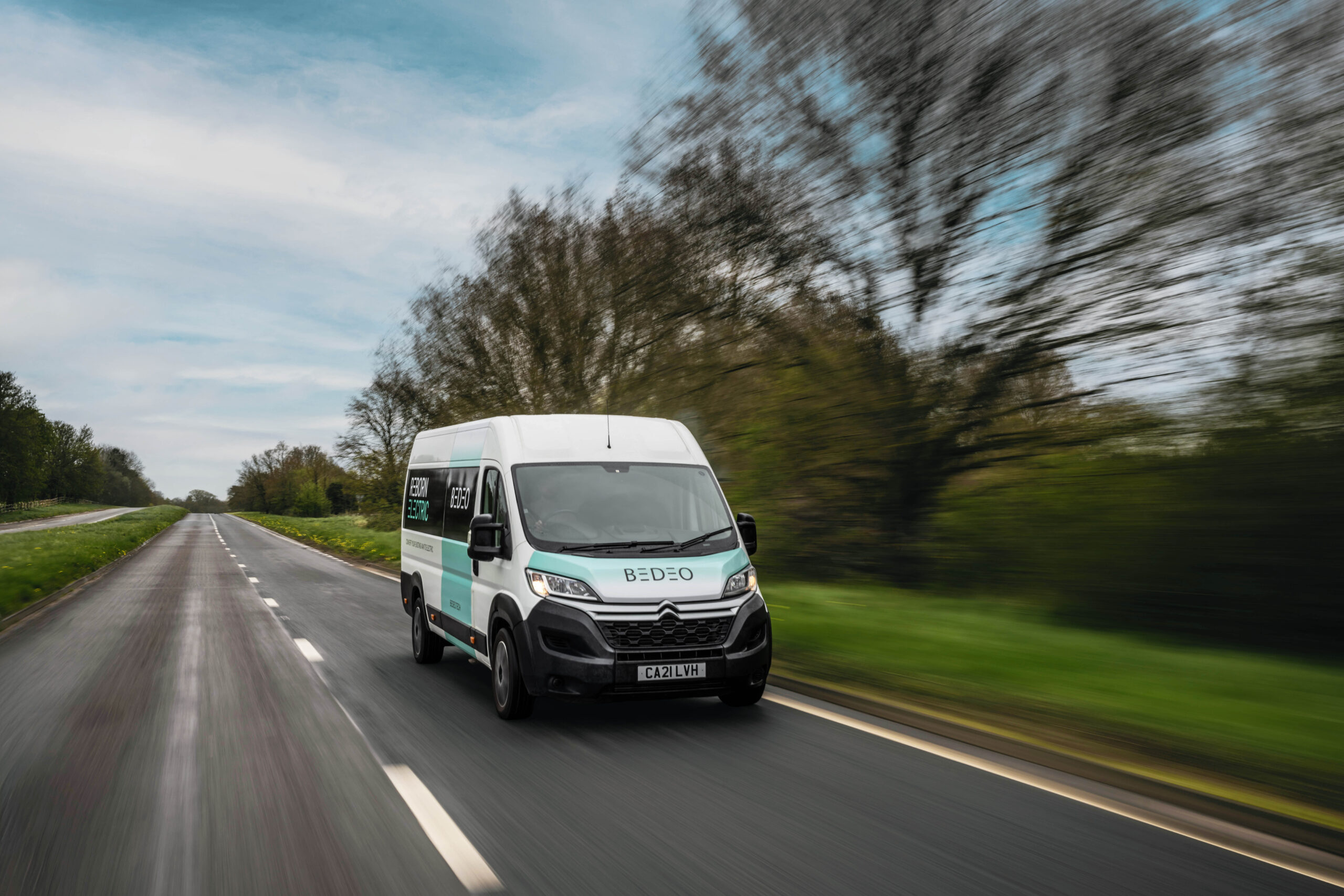Alarming research from McKinsey & Company (McKinsey) reveals that light commercial vehicles (LCVs) account for 40 per cent of all logistics-related emissions, which is eight times higher than the five per cent attributed to air freight. Fleet electrification experts at BEDEO urge both industry and government to seriously consider electric retrofitting as a solution to reduce the LCV sector’s emissions immediately, rather than waiting until 2035 and beyond.

Farnham, 19 August 2024:
A recent McKinsey & Company (McKinsey) report on pollution highlights that light commercial vehicles (LCVs) are the largest single contributor within the logistics industry (40 per cent). BEDEO, a pioneering leader in the electric mobility sector, urges governments and policymakers to take immediate action and acknowledge the power of electric retrofitting for large vans. Failure to do so could mean missing a critical opportunity to significantly reduce emissions while promoting a circular economy, warns the UK-based fleet electrification experts.
The McKinsey report* is live at a time when UK-based battery electric LCV (eLCV) registrations are declining and diesel-powered LCV sales are rising. Data from the Society of Motor Manufacturers and Traders (SMMT) show that just 5.1 per cent (10,260) of all new LCVs (<3.5t and Rigids between 3.5 – 4.25t) registered this year are battery electric, which has reduced from 5.6 per cent (11,016) market share in 2023. In contrast, Diesel <3.5t sales this year are still on the up, reaching 187,223. New registrations in July 2024 – over 5,000 more than last year (2023)**.
BEDEO believes that high upfront costs, limited availability, and perceived reductions in load space are significant barriers to buying brand-new eLCVs. However, BEDEO’s innovative ‘third way’ – retrofitting an electric powertrain through its Reborn Electric programme – provides a cost-effective alternative to purchasing a brand-new eLCV, offering electrification at a significantly lower price while preserving load space and reducing the overall CO2 emissions produced by LCVs.
McKinsey’s report, released earlier this summer, emphasises the urgent need for fleet owners, OEMs, and policymakers to take stronger action in reducing LCV-related tailpipe emissions. BEDEO urges large van fleets and regulators to recognise the potential of electric retrofitting, particularly with its Stellantis-approved Reborn Electric system, which adds an electric powertrain to ageing diesel vans, giving them a new lease of life. This method is the subject of BEDEO’s whitepaper, titled ‘Accelerating the Transition, Supporting our Businesses: Enabling Low-Emission Fleets with Retrofit Electrification’, which underscores the critical need for introducing incentives for those looking to retrofit, and for retrofitters to be tighter regulated and scrutinised on safety and quality standards.

Osman Boyner, Founder and CEO of BEDEO said: “No longer can we hide from the facts – LCVs are the single biggest polluters in the logistics industry. Our reliance on them isn’t going to reduce, and for good reason – LCVs are the backbone of the logistics industry – however, we need to rethink the way we power them [mainly with fossil fuels] and offer cost-effective electric versions now, and not just wait until they’re banned – that could be in 2030, 2035 or even beyond that.
https://www.mckinsey.com/capabilities/operations/our-insights/decarbonizing-logistics-charting-the-path-ahead“Our solution is to offer retrofitting. Retrofitting electric powertrains is a pragmatic solution to achieve a faster LCV transition to net zero. The ‘TCO2’ approach, as we have coined it, combines total cost of ownership and CO2 considerations, offering a sustainable and economically viable path forward for large van fleets across the country. We have worked tirelessly to ensure that our retrofit solution ensures a lower TCO compared to investing in entirely new [large van / LCV] fleets, with operators able to realise savings on fuel and maintenance while also allowing for operational continuity – retrofitting can be accomplished with minimal downtime, ensuring that fleet operations remain uninterrupted.
“The UK van industry truly is at a pivotal moment. Without swift action and the adoption of innovative solutions like our in-wheel motor technology, we risk falling short of our impending net-zero goals,” Osman continues. “We urge the Government to recognise and support these alternative electrification pathways, which not only make economic sense – for both the country and fleet managers everywhere – but are crucial for achieving our environmental commitments.”
Supporting this is a BEDEO whitepaper, titled ‘Accelerating the Transition, Supporting our Businesses: Enabling Low-Emission Fleets with Retrofit Electrification’, which underscores the critical need for introducing incentives for those looking to retrofit, and for retrofitters to be tighter regulated and scrutinised on safety and quality standards. By embracing retrofit solutions, the UK can mitigate the environmental impact of diesel vans and passenger cars, improve air quality, and accelerate progress towards a greener, more sustainable future. BEDEO has submitted this whitepaper and other evidence for the government’s Registering historic, classic, rebuilt vehicles and vehicles converted to electric: call for evidence*** as officials review policies and processes relating to DVLA registrations for conversions.
To access the full whitepaper and learn more about the imperative for investment in retrofitting solutions, visit bedeo.tech/whitepaper-accelerating-the-transition-supporting-our-businesses.
– Ends –
* Decarbonizing logistics: Charting the path ahead
** SMMT data: LCV Registrations July 2024
*** Registering historic, classic, rebuilt vehicles and vehicles converted to electric: call for evidence
About BEDEO
BEDEO (formerly BD Auto) has established itself, and its group companies, as one of the most trailblazing, transformative and trusted vehicle electrification technology providers globally.
Founded in 2009 by Osman Boyner, the company is headquartered in Farnham, UK, with manufacturing in Turkey and China. BEDEO’s vision is to decarbonise the LCV industry utilising its proprietary, in-house manufactured electrification solutions, including but not limited to: its in-wheel motor (IWM) technology, inverter, battery pack and cabling.
Today, BEDEO Group, which consists of BEDEO and Protean Electric, collectively hold over 300 patents and OEM production credentials in safety, production and homologation. Focusing on the next generation of decarbonisation solutions, BEDEO Group continues to develop technology IP to lead the path for a cleaner, more connected future.
Approved by leading OEM group Stellantis, BEDEO can fit Reborn Electric solutions to a wide range of large commercial vans including the Citroën Jumper, Fiat Ducato, the Peugeot Boxer and Vauxhall / Opel Movano (brand depending on market), with the intention to be a solution provider for all large vans.
BEDEO’s transformative approach and unmatched time-to-market speed have also made it the partner of choice for over forty blue-chip customers in logistics, e-commerce, online grocery and food retail, and urban waste management including Aras-Kargo, DHL, DPD, Migros, Ocado and TNT / FedEx among others.
With a focus on making a radical impact on decarbonisation in city centres and accelerating the overall transition to fleet electrification, BEDEO recently introduced an innovative and advanced retrofit solution (named Reborn Electric), converting existing diesel vans into electric or range extended using IWM technology, solving range anxiety issues and low-emission concerns in one solution.
With a commitment to sustainable mobility, BEDEO is actively expanding into the marine and aviation markets.
For more information, visit bedeo.tech.
Media Contact
Hannah Burgess
hannah@hannahburgesspr.com
+44 (0) 7730 570975

